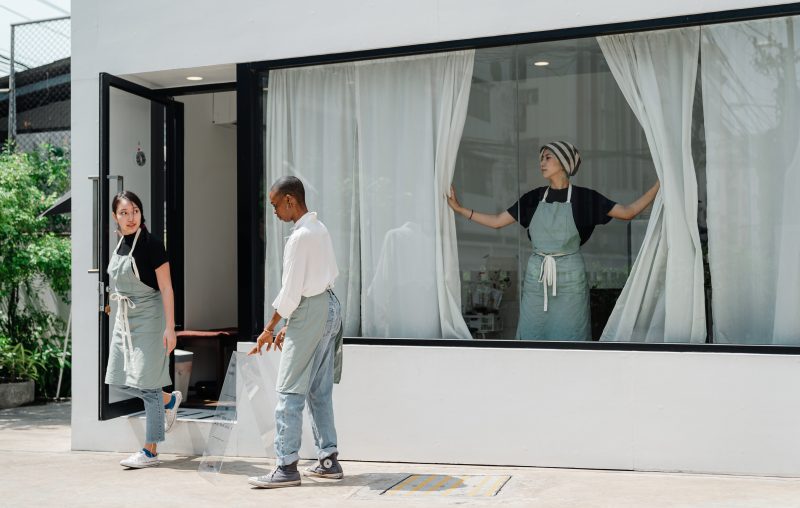We address 3 problems restaurant managers face
Multi-tasking and the restaurant manager
Restaurant managers certainly don’t have an easy job. What with overseeing both the food and drink aspects of the business, and dealing with personnel and operations, there are a number of problems restaurant managers face in their daily lives.
On top of this juggling act, restaurants today face a great deal of competition, and in order to succeed, restaurant managers are forced to stay up to date with the industry. Food trends, day-to-day operations, marketing and customer service are all things that restaurants must stay on top of, in order to prove successful against their competition. With a few slips, a restaurant can suffer the consequences.
So with all of this, and only a limited number of hours in the day, how can a restaurant manager remain efficient and effective in their work? In this article, we outline only three of the main problems restaurant managers face in their everyday lives and offer a handful of thought-provoking ideas relating to how one can begin addressing these problems.

Hiring and staff turnover
Anyone who has worked in hospitality over the years will know too well that turnover is a considerable problem restaurant managers face. Restaurant employee turnover rate averaged 73% in 2017, meaning that restaurant managers had to replace approximately three in four staff once per year.
It goes like this. Employees join the workforce. If they work part-time, or on the side of something else, a manager often gets the sense that they’re not completely committed to the role. What’s more, those who are students or who are at ‘in-between’ stages in their lives are often looking for gap fillers when you employ them, even though it may not be clear within an interview itself. Ultimately, hospitality attracts those seeking temporary roles.
Alternatively, those more interested in remaining within the industry find the availability of roles somewhat attractive and thus it is common for staff to move between restaurants with ease, until they find the right fit. For restaurant staff with experience, depending on the circumstances, it is usually not too difficult to find alternative work with short notice.
Unfortunately, high turnover results in a number of negative impacts for restaurants. For example, the hiring process becomes somewhat ongoing, taking away precious time from the manager. In the meantime, those who join the team are required to embark on a training process, also consuming precious time. Finding people to develop becomes key to the process when you are a restaurant manager.
Our tips
Ultimately, spending more time on finding, training and looking after your staff will reduce the cost and time in the long run. This will also assist with your reputation, as well looked-after staff results in success in this high-turnover industry. Toxic work environment, lack of career progression, inefficient communication, and a disconnect with managers, are some of the main reasons staff leave a job in the hospitality industry. Eradicating these problems starts with the hiring process.
Hiring
During the hiring process, take time to interview thoroughly. Find out an interviewee’s strong points and learn about the candidate’s personality. Avoid agreeing to hire someone simply because you can’t take the time to interview more candidates; in the long run this could be a regret. In addition, be clear and open with the candidate when it comes to career progression, the approach to scheduling, the style of your management and the preferred communication methods. Encourage open communication in order to get the most out of your interview process.
Training and looking after your staff
Adequate training is necessary for a success restaurant business. Customers should receive consistency in your chosen customer service style and should know what to expect. A lack of consistency fundamentally becomes very apparent to guests, who won’t be impressed by drastically contrasting experiences from one week to another. Restaurant employees should be trained to have not only great menu knowledge, but also customer service standards and protocol and an understanding of your brand and concept. The good news is, constantly training staff and allowing them to be involved in the process of growing from feedback can assist with staff satisfaction and role ownership.
For a separate and in-depth article regarding how to maintain happy and efficient staff, and the benefits of doing so, please click here.

Menu decisions
One of the other very different problems restaurant managers face, comes in the form of a menu. Depending on how much say the kitchen at your establishment has in the menu, you might be left with a lot, or little influence. However, the influence you have should reflect a number of things.
A good menu is a balancing act, because you have to make sure that you have enough dishes on offer, but not too many. Too many dishes on a menu not only takes longer for guests to order from, but it sometimes appears too ambitious and can result in wastage. A theme across the menu is also paramount to portraying your brand and concept, and strengthens your menu. You should also price the dishes at your restaurant appropriately without asking for too little or too much. This could be in relation to the cost of meals at similar restaurants in your area. It might seem obvious, but your restaurant’s profits essentially depend on the pricing and creation of your menu. Below, we try to help you rethink your menu and get it right.
Our tips
Sticking to your brand is key to a successful menu. The food on our menu reflects the theme of your restaurant and the quality of your food. Resist offering twenty main options and ten dessert options unless you have to; it’s just not necessary for restaurant success. Take the time to construct a menu that reflects the strengths of your chefs and the brand of your unique establishment. Less is usually more.
Of course menu decisions also come with economic decisions. Consider the popular dishes on your menu, and what isn’t so popular. Resist being stubborn about what you consider to be good dishes, and act according to what sells. If you’re in a cosmopolitan city where trends are pointing towards plant-based options, and no one is ordering the steak, maybe it’s time to take it off the menu. Also consider what your most profitable items are and what it costs to make each menu item. With this information, you can make smarter decisions. Sit down with the chefs every month and consider what is and isn’t working. Resultantly, you’ll end up with a menu optimised for not only guest experience but also profit.
Finally, your menu needs to look and read professional. Consider hiring a copywriter who specialises in the restaurant industry and give your menu a professional boost. In addition, speak with your web developer and check that menus are not only up to date but also mobile friendly. Potential clients use their phones to look at restaurant menus more than you think, and an unfriendly user experience will send people to other restaurant websites in your region.

Dealing with unpredictability
Restaurants in 2020 know all too well the consequences of unpredictability, with covid-19 causing unbelievable pressure on hospitality businesses all year. Unpredictability is however a theme that pervades throughout the restaurant industry as a whole, and it is the restaurant manager who has to make the calls during uncertain times. One of the main problems restaurant mangers face, is that there is no surefire way to accurately predict how many people will eat at your restaurant and what they will order. As a result, there’s also no accurate way to know how many staff you need during a shift or how much of each dish you need prepared. There’s also a great deal of uncertainty surrounding how many staff will quit throughout the year, adding to the problem. As we have learned this year, there’s also no way to predict sudden societal or global changes which might effect your business.
Unpredictability paired with bad decision making or lack of preparedness can result in a number of consequences. Poor decisions in terms of staffing can result in either lack of staff and therefore bad service or too many staff and therefore high costs. Under-ordering or over-ordering certain produce and stock can result in unhappy customers when things run out, or high costs when everything goes to waste. As a restaurant manager, how do you deal with these problems which most of the time can’t be accurately predicted?
Our tips
It’s easier said than done, but those restaurants which survive periods of uncertainty or even thrive during usually quieter times, are those which embed: efficiency, forecasting and guest experience into their restaurant processes. With a combination of these things, restaurant managers are more likely to remain resilient to internal and external pressures.
Efficiency
Restaurants that keep waste – time, money and resources – to a minimum are more efficient, partially because they keep unnecessary costs down. However, streamlining processes can also result in happier staff and smooth services. In terms of food, a smaller menu, or a menu comprised of less perishable food, as well as tighter control on inventory, can help to reduce food waste.
Meanwhile, managing staff costs is also important. Avoid over-staffing and having people stand around; staff costs are some of the most expensive parts of your business. Instead, hire a more logical number of staff and consistently train them, whilst keeping their job satisfaction high. As a result, you will deliver high quality service and a hard working team. Perhaps there are also some tasks which could benefit from the assistance of staff members during slow periods. Do you have a waitress interested in marketing or a kitchen hand hoping to become a chef? Make the most of the help you have around you and hand over some responsibilities for those interested in branching out.
Finally, if you’re not already digital, the time has come. Your back-office processes need to be efficient and should help you record important data which helps your business to forecast and flourish. Despite a cost coming with this kind of installation, the impact on your business will be significant and somewhat time efficient moving forwards.

Forecasting
Restaurants are unpredictable in nature, but the patterns you do have should absolutely be monitored. Using restaurant analytics from your POS system can help you create sales reports and therefore make forecasting much easier. Referring to detailed reports can help you make decisions in all areas of the business as a restaurant manager. Diving into the past, present and future, with an efficient system in place, you will be able to make projections which will point towards staff numbers, ordering and much more.
Analysing your data, you may spot that a cold stretch resulted in more business in your cosy establishment, or that brunches in early January were booked out whereas dinner was quieter. When next year comes around, you will be much better equipped to manage each shift.
Guest experience and loyalty
Covid-19 taught restaurant managers the difficult lesson that it’s not always possible to predict or forecast. On the other hand, managers also learned that the public inherently enjoys supporting local businesses that they love. Guest experience then becomes very central to remaining consistent during difficult times in the restaurant industry.
If your restaurant is best known for its affordable food, keep this in mind. During quieter times, why not offer takeaways or delivery of the most popular dishes on your menu? If your cafe and restaurant is known for its beautiful interiors and cosy atmosphere, why not advertise a socially distanced coffee morning deal for the elderly? Perhaps your chef makes the best steak around, why not offer an online class which teaches how to cook the perfect steak? Understanding what your guests like most about your business and brand is important, so that you’re able to dwell on the right aspect of your establishment and get through the difficult stints. Guest loyalty and innovation are jointly important during difficult times.
Ask 1834 Hotels a question
1834 Hotels is an experienced Food & Beverage operator, currently managing around $40,000,000 of food and beverage sales across our group. We specialise in activating sales, costing menus and products appropriately and using our business intelligence tools and reports to ensure cost of goods, wastage and overall satisfaction is maximised. We also ensure all WH&S obligations are met and adhered to within the business.
To find out more, or to ask us a question about our Food & Beverage management, please click here.

